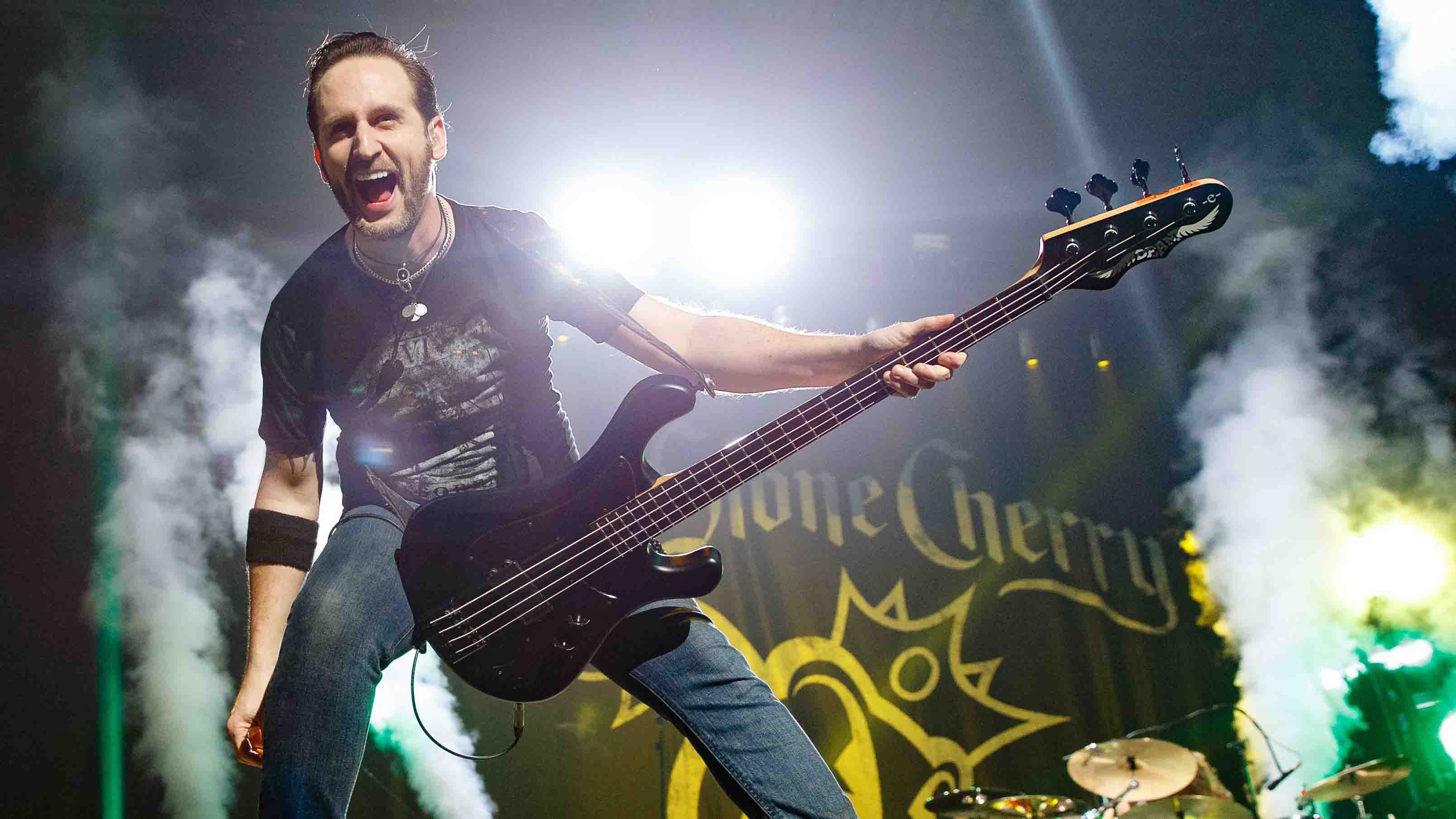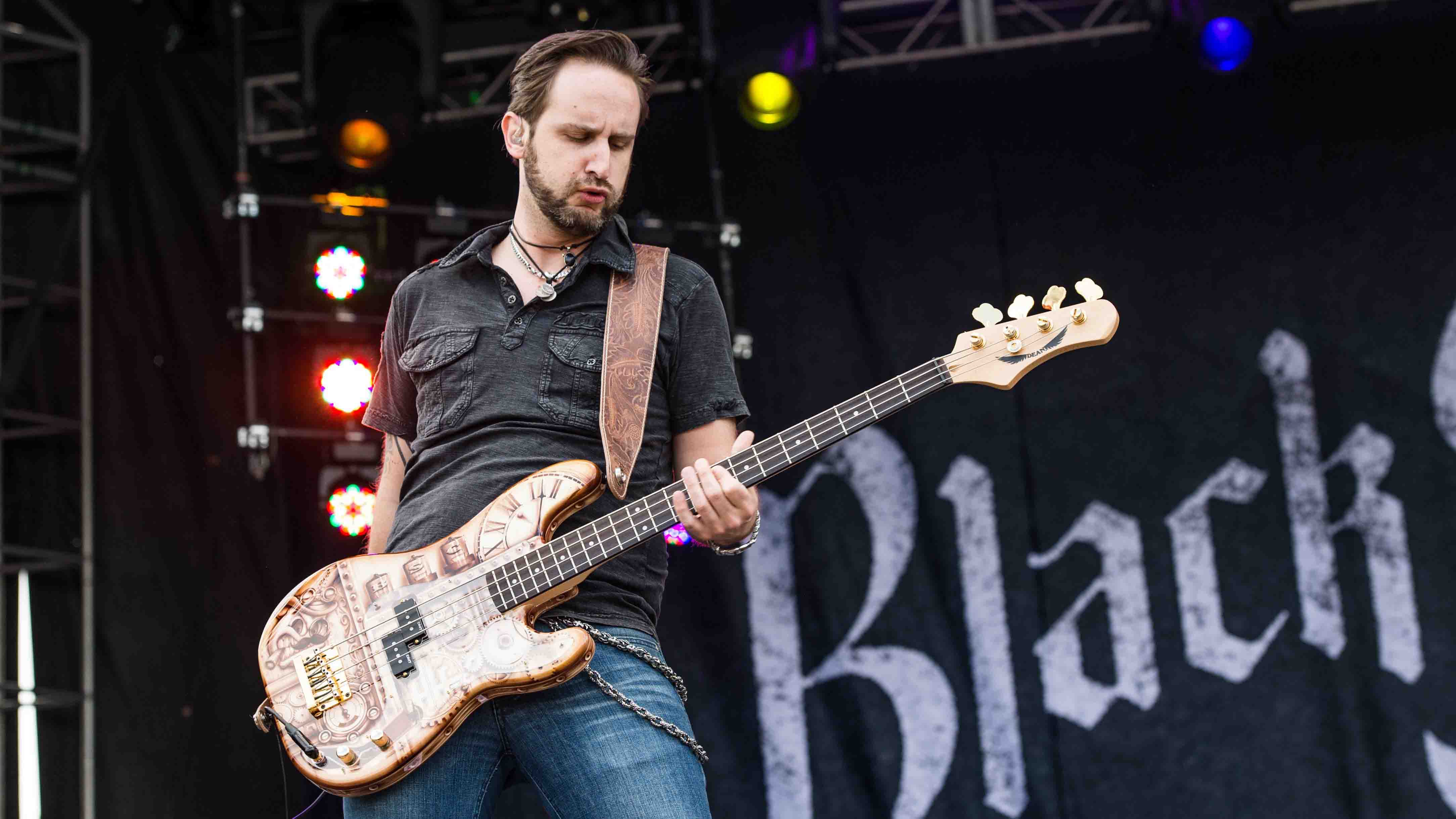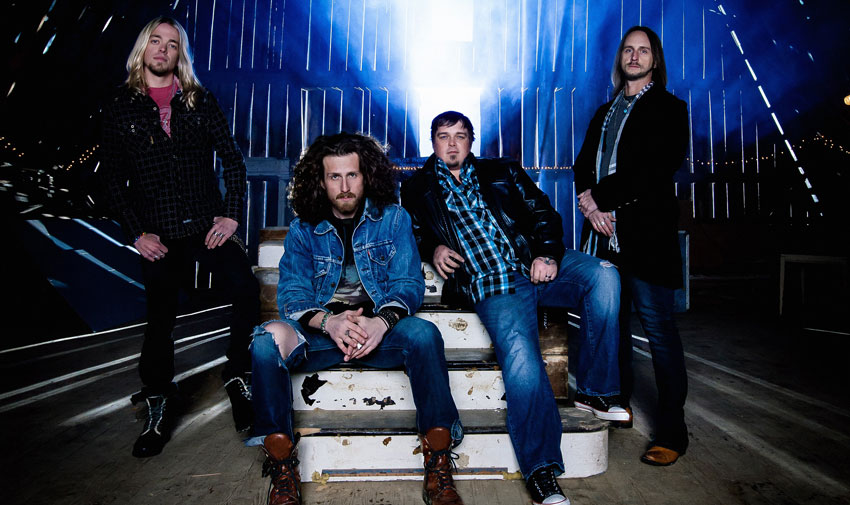Black Stone Cherry's Jon Lawhon on playing 'lead bass', his signature Dean and recording with Bob Babbitt
Southern rock low-end maverick speaks

Kentucky
Kentucky, home to head-spinning bourbon, speedy horses and Southern rock juggernauts Black Stone Cherry: for over 15 years, these good ol’ boys from the bluegrass state have smashed down the typical boundaries that surround contemporary American country rock.
Instead of wailing about trucks, blue jeans and deep fried poultry, BSC have embraced the true spirit of Americana in all its forms, adding hip-shaking Motown grooves, bluesy serenades, and - most importantly - riffs so beefy you’ll need a steak knife to handle them.
As of last year, bassist Jon Lawhon - along with bandmates Chris Robertson (vocals/guitar), Ben Wells (guitar) and John Fred Young (drums) - have album number five, Kentucky, notched firmly into their belts. BGM caught up with Lawhon in Cardiff, on the first night of their recent two-set acoustic/electric tour. With only half an hour until the curtain goes up, how is the bassist feeling at this point?
“Man, we are so excited, but we are so freakin’ tired and stressed out,” chuckles Lawhon. “The first day is always rough, especially when you do a tour like this. We’ve done an evening with just us before, but never two sets, and it’s two completely different takes on our band. We’re playing songs on this tour that we haven’t played in a decade.
“It’s a way for us to return to our roots,” he continues. “By coming down to this scale it lets the super die-hards get a better look into our world, and we can play whatever the hell we want for hours. We’ve never really done an acoustic set like this before, which is a completely different side of our band that we want people to see.”
Does he prefer playing unplugged or is he sticking to the electric, we ask? “I like acoustic basses, but they’re kind of a bear to wrangle. When you’re trying to do it with the PA system and all that stuff it becomes a pain in the ass, so what I’m starting to get into right now is my electric basses and my pedalboard, which is the same one that I use for my live electric set. I DI my bass, so there’s no amp in sight. We’ve got the monitors on either side and I just use a SansAmp plus a Stellar preamp compressor pedal.”

Taking the lead
Kentucky is a big step forward for Lawhon and his band. Their first since switching from Roadrunner to the Mascot label, it’s the first for which BSC took on the responsibilities of producing themselves.
This was the perfect opportunity for Lawhon to spread his rhythmic wings, taking back creative control of his domain.
On all our previous albums I always heard the same s**t: ‘Be big and dumb, play it simple’,” he says. “For this record I was like, ‘You know what? Screw that!’
“On all our previous albums I always heard the same shit: ‘Be big and dumb, play it simple’,” he says. “For this record I was like, ‘You know what? Screw that!’ It’s not just me either: it’s John Fred as well. They tried to put a rope around us and pull us back because we’re wild players. There’s stuff on our first album from both of us which is just wild and crazy, that we revisited on this record.
“The credits on our first record even say ‘lead bass’ because we were playing all kinds of shit. After that it was like, let’s be as simple as we can possibly be, because we were told the general public wouldn’t get it. That’s bullshit: the general public gets it. They want their minds blown. It’s like that on this record - rough and ready to roll.”
What was it like to have all the creative responsibilities lie on their shoulders, we ask?
“Producing your own record is hard to do because you’re so close to the project,” he replies.
“You tend to be a little bit more free with it than you should be. We wanted it to be a little off-centre on the raw side of things, maintaining that rock ’n’ roll integrity. I feel we did our job, and everybody tells us that we have, so I’m going to listen to them and say that we have!”

Tracking with Bob
In his time with the band, Lawhon has met some pretty incredible people, even striking up a friendship with the late Motown legend Bob Babbitt. How did this unusual pairing come about, we ask?
“I met him in Los Angeles at the Fender Bass Bash,” remembers Lawhon. “I was just sitting there playing, and I saw Bob Babbitt there and I just froze. I stood up, shook his hand and told him, ‘You, James Jamerson, the whole Motown movement - you completely changed my life.’
“I got to be good friends with him and when we recorded our second album [Folklore And Superstition, 2008] in Blackbird Studio in Nashville, where Bob lived, I called him to come over to say hi. By this point, I thought we were done with bass, but we went back and there was a tuning problem, so we scrapped all my bass parts. I was like, ‘Fuck it, I’ll cut it all again.’
Bob was sitting behind me to my left, just watching me and listening to me play. He was so complimentary about my playing
“The day that I literally recut every single bassline on that record so happened to be the day he was coming to visit me in the studio. I sat there all day and Bob was sitting behind me to my left, just watching me and listening to me play. He was so complimentary about my playing. I still listen to that record and I can still think back to the thoughts, inputs and ideas he gave me. He was just there being a bro. I was shaking the entire time!”
Putting himself under the microscope, how does Lawhon describe his own playing, we wonder?
“I do a little bit of everything, because that’s what our band requires. People look at us like we’re a heavy Southern band, but we’re not. We’re a Motown band, we’re a funk band and we’re a rock band.
“There are times where I’ll slam out a pick into the crowd and hammer out a fingerstyle line, or I’ll just close my eyes and mellow out for a while with a pick. There are times in the songs where I have to roll up my pick in the palm of my hand and play with my middle finger and my ring finger. Then I’ll roll it back out and bring the pick back in, it always just depends on the dynamics of the song and what the song calls for.”

Keen for Dean
Faithfully sticking to his manufacturer of choice, Dean, Lawhon has happily wielded a Hillsboro Single for many years. What’s more, he has been working on a signature model for some time. Judging by the eagerness in his tone, this is one bass that you’re not going to want to miss.
“I’m working on a signature model right now with Dean’s Paramount series, which is similar to the P-Basses I used to play. They’ll be out early next year, I hope. It’s going to be a colour burst with a tortoiseshell pickguard, alder body, maple neck, rosewood fretboard and their DMT pickups. They sound great. The wiring is hot-rodded like crazy, and man, those pickups sound stellar, they really do. Those guys really nailed it!”
With only moments before show time, we ask if he has any pearls of wisdom to aspiring bass players out there?
“The best thing I can say in terms of advice for a bass player is do your own thing. Don’t let anyone else influence you - and don’t worry about being the ‘look what I can do’ bassist. If that’s not your thing, that’s not your thing. Play for the song and not for yourself, that’s the most important thing!”
Kentucky is out now via Mascot.


